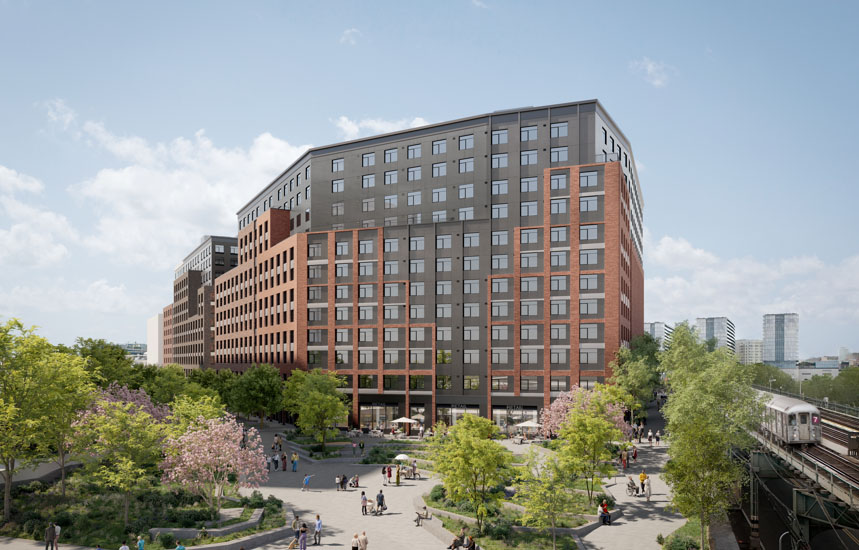News:
Owners Developers & Managers
Posted: January 4, 2008
Always a new beginning: Trends having momentum in the residential and commercial R.E. segments
Each new year presents an opportunity to review our attitudes, behavior and general approach to the world. Even if you're not one for making resolutions, it's a natural human instinct to feel that the beginning of a new year represents a chance to make changes and try new approaches. Accordingly, all organizations in our industry, including mine, will strategize about what to focus on in 2008. Initiatives concerning efficiency, goals and profit will abound.
We are frequently asked by our clients and prospects to discuss market trends and participate in systems and technology improvement initiatives. It's interesting to me that technology in itself represents the epitome of the "something new" opportunity. In the retail consumer electronics world, for example, there always seems to be a new gadget that raises our interest and tugs at our wallets. This is usually true in the business realm as well. However, in business, unlike in our personal lives, adopting a new technological approach involves a coordinated vision at the top and execution and acceptance throughout the organization. This process is not as easy as going out and picking up that new cell phone, an action whose impact is restricted to one's patience and a self-contained desire to experience the new features.
On the other hand, the organization has a competitive element that the individual lacks. Now don't get me wrong, there are personal drivers that might resemble the competition in the market place. We call this "keeping up with the Joneses," and those concerned with the statement their gadgets say about them will be driven to pursue them. However, no one really loses anything of substance if these personal technology purchases are not made. In business, however, failing to keep up with the progress of technology can have a negative impact on the bottom line. Often technological deficiency is first recognized by the customer, long before the business perceives it. Unfortunately this becomes evident only after the customer stops being, well...a customer.
I'll give you an example from my life. My son's orthodontist has a forward thinking practice that provides the technology for my son to confirm his appointments online from home. He receives confirmation via automated call service, and when he arrives he checks in with a bio scan of his index finger. The waiting room has flat panel monitors with every video game imaginable. Of course my wife and I send our son to this office because the orthodontists are talented and their work is high quality, not because of the "bells and whistles." Nevertheless, since their work is at least equal to that of our previous practitioner, a shift has happened with me, the consumer. I no longer think about these two professional organizations on equal planes. To me, the new guys represent professionals who think about how technology impacts their customers and have delivered some tangible things that make the experience better. They communicate the way I communicate and value my time and my son's time the same way we do. They have started to deliver their service in a way that matches more closely the way we interact in the rest of our lives. Our original practitioner lost a customer to competitive technology.
Our industry is no different. Technology as a competitive strategy is now paramount in real estate. In that vein, here are some trends that we view as relevant and having momentum at the moment across both the residential and commercial real estate segments.
Online leasing: The idea of marketing properties and units online is not new. Now, however, increased efficiency and integrity across the data through integration of online marketing information with the organization's back-end systems is a growing trend. The residential industry clearly wants to offer system-optimized rents for available units in a property, and accomplish the leasing process entirely in an online environment. The "paperless" leasing workflow has been this sort of vision for several years, but the time has come and many organizations are already doing it. Technology providers in the marketplace today enable this kind of automated service. We understand the innovative direction and competitive nature of this industry, and we recognize that tomorrow's renters will expect such access.
Feature rich resident services on the web: Your next-generation occupants come from a world where almost everything they consume, the people they date and marry, finding employment, and your phone number are all accessible through the Web. With the proliferation of hand held devices, they are also mobile consumers who expect instant information and service from anywhere, anytime. Do not think that the real estate management services will be exempt from this fact of life. Residents will expect easy access to a rich online environment that allows them to carry out every necessary transaction with landlords. Commercial tenants will soon find much greater technology around the physical management of their space. Such actions as controlling office temperature, reserving a building amenity and exercising an expansion clause will be packaged and delivered through a sophisticated tenant portal. Like my experience with my son's orthodontist, I think that once you experience these types of services as a tenant, you'll regard renting in a space that doesn't offer them as moving backward.
Globalization: Yes, that's correct. I said globalization and yes, it is understandable if you believe that this term is beginning to become somewhat clichéd. It's true that we've been hearing a lot about globalization over the past 10 years. But here's an idea for real estate globalization that in my opinion transcends all segments. First of all, investment dollars are chasing international assets; therefore, organizations need to deal with many currency and reporting issues. Second, your investor community could be located in places you never heard of, and your next tenant may have a frame of reference that is international, not regional. Accordingly, you can no longer think of only regional competitors. There are global best practices that both your investors and your tenants will expect of you, which you may lack capacity to meet if you haven't made globalization technology part of your business plan. Here's an example: You rent a luxury residential unit to an individual from Germany who will be in New York for two years. You ask her to write you a check for the first month's rent and security deposit. She says, "What is a check? I would like to transfer the money electronically and set up a recurring debit to my German bank account." Will you be able to provide such service for her? Your most forward-thinking competitors will. And therefore, your competitors are no longer just the guys down the street in New York or elsewhere in the U.S. They may also be in Europe, Asia, the Middle East, or other locations.
Co-creation and un-bundling of service: More and more rudimentary recurring operational elements, such as accounts payable, procurement and accounts receivable, are perceived as functions that can be distributed to partners and third parties. Real estate managers are becoming increasingly aware that their profit and growth engines do not lie in their ability to produce accounts payable or process rents. Already, we have seen several organizations decide that purchasing light bulbs and floor wax is better left to distributed business partners who can control costs through corporate-wide spend management, transparency, and better efficiency. This un-bundling of historically conventional processes also allows for the organization to focus on the market-facing business components that impact their customer base and help grow revenues, such as tenant responsiveness, occupancy and brand building.
Green and Intelligent Buildings: Whether or not you accept the notion of global warming, you cannot argue against the soundness of energy efficiency, sustainability and the resulting savings to building operators, particularly as fuel prices rise. I believe that integrating efficiency and controlling energy consumption, combined with green initiatives, is becoming a major trend. As with other real estate technology, in time the adoption of technology that will enable such initiatives will transform from innovative principle to competitive necessity. This trend will continue to provide major opportunities for owners, managers and a host of vendors to pursue the idea of intelligent and green buildings. Again, these are concepts that we have been reading about for years; but now, they're actually happening. We anticipate that soon the IT staffs of major owners and managers will be as involved in building-related projects as the construction and maintenance staffs are today. Ultimately your property is going to look like a large data network designed to control lighting, HVAC, staff performance, security, MRO, spend, and utility efficiency. The properties that do this well will run better and at less cost and therefore, will be more attractive to tenants and investors.
Is your business plan updated to include the technology initiatives that will let you be competitive in 2008? Whether you are a believer in these trends or not, the beginning of a new year is always a good time to take inventory of where you are today and consider some new directions.
Richard Malpica is the vice president and general manager, Eastern region for Yardi Systems, Inc., Glen Head, N.Y.
MORE FROM Owners Developers & Managers
Related Cos. and Sterling Equities open housing lottery for Willets Point Commons
Queens, NY Queens Development Group (QDG) – a joint venture between Related Companies and Sterling Equities – in partnership with the New York City Department of Housing Preservation & Development

Quick Hits
Columns and Thought Leadership

Strategies for turning around COVID-distressed properties - by Carmelo Milio
Due to the ongoing pandemic, many landlords are faced with an increasing number of distressed properties. The dramatic increase in unemployment and reduction in income for so many has led to a mass exodus out of Manhattan, an increase in the number of empty rental units

The CRE content gap: Why owners and brokers need better digital narratives in 2026 - by Kimberly Zar Bloorian
As we head into 2026, one thing is clear: deals aren’t won by who has the best asset; they’re won by who presents it best. Yet many owners, operators, and brokers are entering the new year with outdated photos, inconsistent branding, and limited digital presence. This






.gif)


.jpg)
.gif)